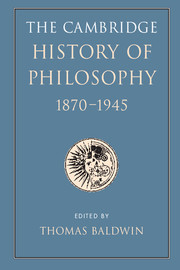Book contents
- Frontmatter
- Contents
- List of contributors
- Introduction
- I 1870–1914
- 1 Positivism, Idealism, and Pragmatism
- 2 Psychology and Philosophy
- 3 Logic, mathematics, and judgement
- 4 Philosophy and the new physics
- 5 The idea of social science
- 6 Ethics, politics, and legal theory
- 18 Utilitarians and idealists
- 19 Nietzsche
- 20 The new realism in ethics
- 21 Individualism vs. collectivism
- 22 Marxism and anarchism
- 23 Legal theory
- 7 Philosophy of religion and art
- Interlude
- II 1914–1945
- Biobibliographical appendix
- Bibliography
- INDEX
- References
18 - Utilitarians and idealists
from 6 - Ethics, politics, and legal theory
Published online by Cambridge University Press: 28 March 2008
- Frontmatter
- Contents
- List of contributors
- Introduction
- I 1870–1914
- 1 Positivism, Idealism, and Pragmatism
- 2 Psychology and Philosophy
- 3 Logic, mathematics, and judgement
- 4 Philosophy and the new physics
- 5 The idea of social science
- 6 Ethics, politics, and legal theory
- 18 Utilitarians and idealists
- 19 Nietzsche
- 20 The new realism in ethics
- 21 Individualism vs. collectivism
- 22 Marxism and anarchism
- 23 Legal theory
- 7 Philosophy of religion and art
- Interlude
- II 1914–1945
- Biobibliographical appendix
- Bibliography
- INDEX
- References
Summary
NEW BEGINNINGS
The 1870s was a decade of new beginnings in British moral philosophy. This was partly in reaction to the work of J. S. Mill, who had dominated the previous decade and whose Utilitarianism had appeared in book form in 1863. First, in 1870, John Grote’s Examination of the Utilitarian Philosophy was posthumously published (Grote had been professor at Cambridge when Mill’s work appeared). Then in 1874, also from Cambridge, came what has justly been called the first work of modern professional moral philosophy, Henry Sidgwick’s Methods of Ethics. Meanwhile an idealist response to Mill (and to empiricist thinking more generally) had been brewing in Oxford, particularly in the lectures of T. H. Green. Its first significant ethical work was F. H. Bradley’s Ethical Studies, published two years after Sidgwick’s in 1876 (whereupon Bradley and Sidgwick promptly fell on each other in critical reviews and pamphlets). At the end of this decade, in 1879, came Herbert Spencer’s Data of Ethics. Although Spencer was more favourable to empirical methods than Sidgwick, Green, or Bradley, and although like Mill and unlike them he worked outside the established universities, he was nevertheless another critic of Mill.
Mill stood for empirical, observational, methods and held that the central ethical issue was between results based on observation of actual human behaviour (which he thought led to his own utilitarianism) and results based upon supposed direct intuitions of moral truths (as believed in by his Cambridge opponent, Whewell). In 1870 the conflict between empiricist utilitarianism and intuitionism seemed to be the central issue, or problem, in ethics. For example W. Lecky’s History of European Morals of 1869 frames its study round the ‘great controversy, springing from the rival claims of intuition and utility’ (Lecky 1869: 1).
- Type
- Chapter
- Information
- The Cambridge History of Philosophy 1870–1945 , pp. 253 - 265Publisher: Cambridge University PressPrint publication year: 2003



